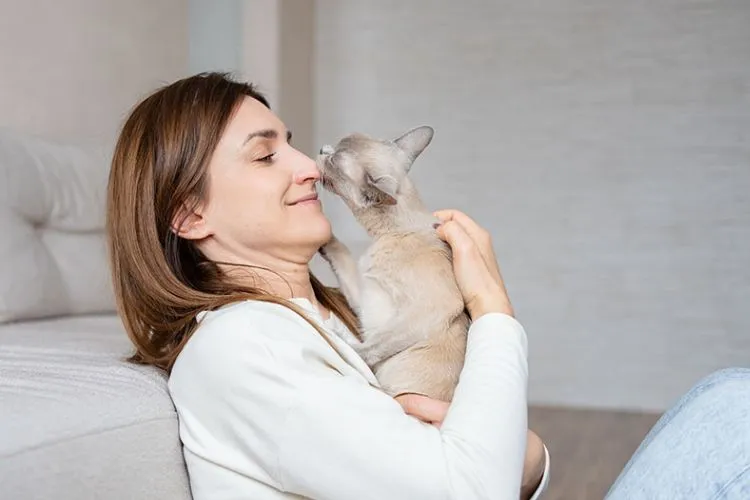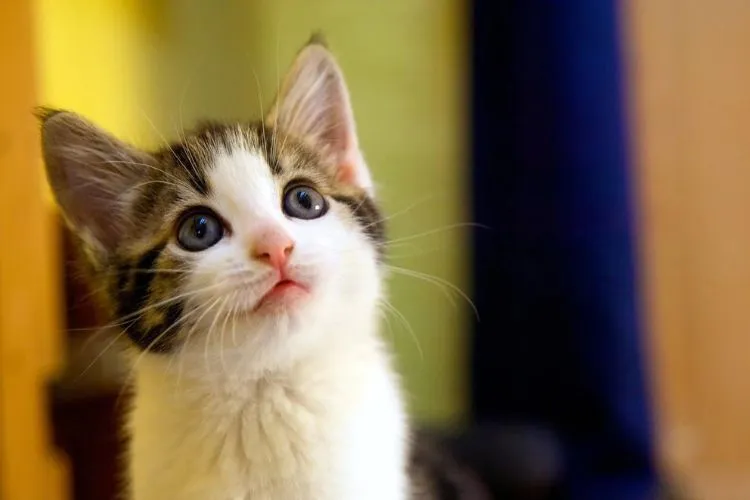Cats are enigmatic creatures, often indulging in behaviors that leave their human companions puzzled and intrigued. One such peculiar activity is when a cat chooses to sniff their owner’s eye. So, why does my cat sniff my eye?
This behavior, while odd, is rooted in the cat’s instinctual and sensory-driven nature.
In this article, we’ll explore the various reasons behind this behavior, the underlying science, and how you should respond to ensure both you and your pet maintain a healthy and happy relationship.

🐾 The Science of Scent in Feline Communication
Cats communicate and perceive their world significantly through scent. This section will delve into the science behind a cat’s sense of smell and how it influences their interaction with their environment and their human companions.
Understanding a Cat’s Olfactory System
Cats possess a highly developed olfactory system, superior to humans, which they use to gather information about their surroundings. This part of the article will explain the anatomy of a cat’s nose and how it processes different scents.
Scent Marking and Territorial Behavior
Cats use scent to mark their territory and familiarize themselves with their environment. This subsection will explore how sniffing plays into these territorial behaviors and the importance of scent marking for a cat.
🐾 why does my cat sniff my eye?
This section will cover the various reasons your cat may be drawn to sniff your eye, providing insight into this peculiar behavior.

Curiosity and Exploration
Cats are naturally curious creatures, and your eye may present a new and intriguing scent. This subsection will discuss how a cat’s curiosity drives them to explore different scents, including those of their human companions.
Affection and Bonding
Sniffing can be a sign of affection and a way for your cat to bond with you. Here, we’ll explore how scent plays a role in the development of a cat’s attachment to their owner.
Scent of Salt and Tears
Humans often excrete salts and other compounds through the skin around their eyes. This subsection will explain how the scent of these compounds can attract your cat and encourage them to sniff the area.
Checking for Familiarity and Security
Cats may sniff their owners to confirm their identity and reassure themselves of their safety and comfort. This part will delve into how cats use scent to recognize and feel secure around their human companions.
🐾How Should You Respond?
Understanding how to appropriately respond when your cat exhibits this behavior is crucial for maintaining a positive and respectful relationship.

Encouraging Safe Interaction
While it’s important to bond with your pet, ensuring interactions are safe and comfortable for both parties is essential. This section will provide tips on how to safely engage with your cat when they show interest in sniffing your eye.
Setting Boundaries
Sometimes, a cat’s behavior may become intrusive or uncomfortable. Here, we’ll discuss how to set healthy boundaries with your pet while still showing them love and affection.
Health and Hygiene Considerations
Maintaining proper hygiene is crucial when allowing your cat close to your face. This subsection will cover the health considerations to keep in mind to prevent infections or allergic reactions.
You may also like to find out: Why Do Cats Wag Their Tails?
🐾 Frequently Asked Questions (FAQs)
Allowing your cat to sniff your eye can be safe, provided that both you and your cat maintain good hygiene. However, it’s essential to be cautious as the eye is a sensitive area. If your cat’s behavior becomes too aggressive or if they try to use their claws, it’s best to gently deter them. Always wash your face and hands regularly to prevent the transfer of bacteria and ensure your cat is up-to-date with their vaccinations and health checks to minimize any risk of infection.
If your cat sniffs and then licks you, it is often a sign of affection and acceptance. Licking, like sniffing, is a behavior rooted in feline social interactions. In the wild, cats groom each other as a form of social bonding. When your cat licks you, they are extending this sign of trust and comfort to you. It’s their way of showing care and maintaining a ‘social bond’. However, if the licking is excessive or becomes bothersome, you can redirect your cat’s attention with a toy or a gentle petting session.
Determining whether your cat’s sniffing is driven by affection or curiosity can depend on the context and other accompanying behaviors. If your cat is purring, kneading, or rubbing against you while sniffing, it’s likely a sign of affection. On the other hand, if your cat has a more focused, intense expression and is investigating many areas, not just your face, they may be driven by curiosity. Cats use their sense of smell to explore their environment, so a curious cat may sniff around to gather information.
Frequent sniffing in itself is not usually a cause for concern and is typically just a sign of your cat’s interest or affection towards you. However, if you notice any signs of discomfort in your cat or if the behavior is accompanied by aggression, it might be worth investigating further. Additionally, if you have any allergies or if the sniffing causes any skin irritation, you should discourage this behavior. In such cases, gently push your cat away and redirect their attention with a toy or a treat. If the behavior persists or if you’re concerned about your cat’s health, consult a veterinarian for advice.
Conclusion:
Maintaining proper hygiene is crucial when allowing your cat close to your face. This subsection will cover the health considerations to keep in mind to prevent infections or allergic reactions.
